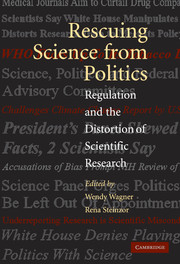Book contents
- Frontmatter
- Contents
- About the Contributors
- Acknowledgments
- Prologue
- Introduction: Principled Science
- PART I FREEDOM AND INDEPENDENCE
- PART II TRANSPARENCY AND HONESTY
- PART III A PUBLIC INFRASTRUCTURE FOR SCIENCE
- 10 Politicizing Peer Review: The Scientific Perspective
- 11 Politicizing Peer Review: The Legal Perspective
- 12 The Government Role in Scientific Research: Who Should Bridge the Data Gap in Chemical Regulation?
- PART IV RECOMMENDATIONS AND CONCLUSION
- Index
12 - The Government Role in Scientific Research: Who Should Bridge the Data Gap in Chemical Regulation?
Published online by Cambridge University Press: 04 August 2010
- Frontmatter
- Contents
- About the Contributors
- Acknowledgments
- Prologue
- Introduction: Principled Science
- PART I FREEDOM AND INDEPENDENCE
- PART II TRANSPARENCY AND HONESTY
- PART III A PUBLIC INFRASTRUCTURE FOR SCIENCE
- 10 Politicizing Peer Review: The Scientific Perspective
- 11 Politicizing Peer Review: The Legal Perspective
- 12 The Government Role in Scientific Research: Who Should Bridge the Data Gap in Chemical Regulation?
- PART IV RECOMMENDATIONS AND CONCLUSION
- Index
Summary
Incentives and Disincentives
Regulation demands information, and regulatory systems create, deliberately or not, incentives and disincentives for generating the information they need. Effective regulatory systems are deliberately structured either to generate the information that they require or to require only the information that they can reliably generate. In this respect at least, federal environmental law and regulatory policy in the United States have failed spectacularly; it is universally acknowledged that, as the principles proposed in this book put it, “there are yawning gaps in the science available for regulation.” Toxic chemicals, both those that are products and those that have become waste, pose particularly challenging regulatory problems, because much of the necessary information is complex, uncertain, and expensive to obtain. Ultimately, we cannot afford gross disparities between the demand for information and the supply of information that is generated by the marketplace and the existing regulatory system.
Most observers of chemical regulation (this author included) have concentrated on finding ways to encourage or to require industry to generate scientific information about toxic chemicals. There are, however, good reasons to think that a strong governmental role in generating chemical information is necessary to fill data gaps and to provide complete and unbiased research. Our principles incorporate that view, positing that government support of research is essential to produce discoveries that benefit the public good, especially because the scientists capable of producing the necessary data often cannot find private sector support for such research.
- Type
- Chapter
- Information
- Rescuing Science from PoliticsRegulation and the Distortion of Scientific Research, pp. 255 - 278Publisher: Cambridge University PressPrint publication year: 2006
- 2
- Cited by



